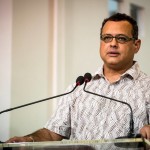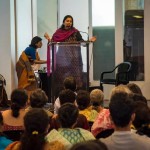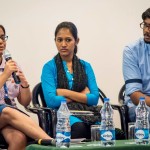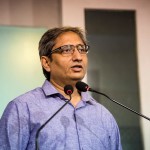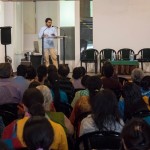Day 3: 17 August 2017
The final day of the conference began with a keynote address from Vijay Prashad, author and Professor of International Studies, threw a new light on history and the idea of India. Prashad contextualised history as ‘possibility, not chronology’, and looked at various schema: from Ayn Rand’s influence and reach, to considering dissent as anti-national, to the abstract concept that is India, models of economic progress, reforms for equitability, and the simultaneous coexistence of all of them, which makes the argument for histories rather than a singular ‘history’.
This address led to another interesting session with the NDTV journalist, Radhika Bordia, who discussed the ‘Impact of Social Media’ on understanding and negotiating with history. She spoke about how history textbooks now have become fodder for ideology, where facts are being altered to suit a regime. She then spoke about how social media therefore becomes an agent for dissent, and cited its use by marginalised voices to mobilise. Simultaneously, she spoke about the other end of the spectrum: fake news, ‘Hindutva armies’ propagating it, and how imperative it is for teachers to battle this barrage of fake news in a time where social media is so pervasive.
The linking of social media and the idea of India became more resolute, when a discussion about the same ensued among three students. Suhasini, from Modern High School, spoke about sexism, dissent, fake news, and a requirement to have changes in perspective. Nikhat from Future Hope spoke about social media as a news source, while Shrijit from Calcutta International School spoke about social media as a disruptive tool in policy making, because of the incredible diversity of opinion it offers. These student discussions added a different dimension to the conference, because it displayed the effects of teaching and understanding, from the perspective of those who are being taught and being made to understand.
Ed Summers took the debate of social media forward in his talk titled, ‘Social Media as a Primary Source for Future Historian’. By deconstructing the library as a concept, Ed Summers looked at social media as an archival resource that records biographies in new methods. To unravel this vast mine of information, Summers emphasised on the importance of inculcating critical thinking and creating historical frameworks for the every day. By doing so, one can unravel and use social media as an epistemological tool. He ended the talk by emphasising the necessity of hope as we move towards the future, and develop new methods of looking at history.
Abeer Gupta, Assistant Professor at Ambedkar University Delhi, and a member of the Advisory Board for History for Peace, summed up the conference’s proceedings, and a feedback session for the conference followed, in which audience members thoughtfully engaged with the panelists and organisers, offering their takeaways from the conference, before the final address by Ravish Kumar.
Ravish Kumar, television anchor and senior executive editor at NDTV India, concluded the conference by speaking eloquently on the idea of India and how it is represented by political dispensations, particularly the current one. He wove in morphed images of him (used on social media) in his narrative—images that on the face of it were funny, but also gave the audience food for thought. Kumar deconstructed the idea of the press and media, and our reliance on an image-heavy world and painted a candid picture of what The Idea of India looks like today, on the ground, from the point of view of an investigative journalist. By countering the images and advertisements that cropped up during Independence Day, as well as narratives used against them, he kept the audience laughing, but left them thinking, even going as far as to say that one must stop watching TV, because of the unreliability of reportage.
The conference ended on a note of revitalizing history thinking and history perceiving, and a renewed relationship with history itself.
– Anushka Halder and Stuti Pachisia
For more details about the speakers, click here.

